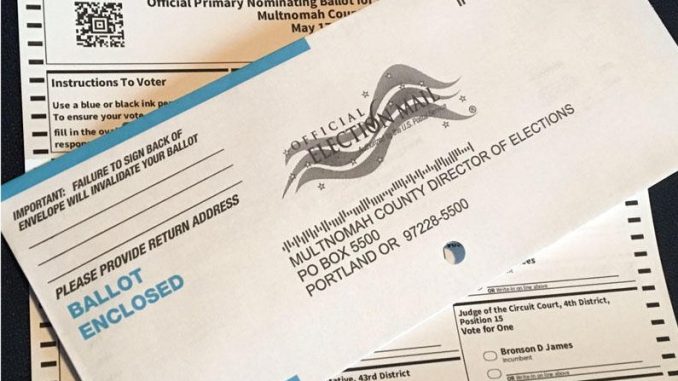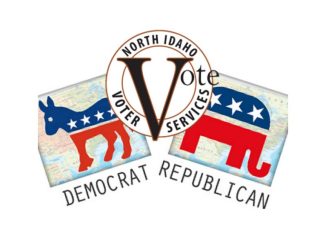
The Hazards of Legislation
No man’s life, liberty, or property are safe while the legislature is in session. ~Mark Twain
The Oregon Legislature passed House Bill 3291 during the 2021 session. The description of the bill directly under its title stated, “Requires ballots returned by mail to have postal indicator showing ballot was mailed not later than date of election and be received by county clerk not later than seven days after date of election.” In reality, the bill did the exact opposite from what the title describes, it voided any requirements for mail-in ballots to have a canceled postmark.
This outcome was obscured within the bill and those who would oppose removal of the postmark requirement may have been tricked into voting for its’ passage. Although not adequate as chain-of-custody, the canceled postmark still served as an assurance that a ballot had gone through a valid delivery system.
The passage of this law opened a back door that dovetailed into the United States Postal Service (USPS) policies on postmarking. Ballots will no longer be required to have a postmark cancellation date because of what seemed to be an exception made for a few ballots that had a defective or missing postmark.
House Bill 3291 amended ORS 254.470 to read: “…(8) If the elector returns the ballot by mail, and a postal indicator is not present or legible, the ballot shall be considered to be mailed on the date of the election and may be counted if the ballot is received no later than seven calendar days after the election.”
The following quote is from the USPS Office of Inspector General in the “Vote by Mail and the Postal Service: A Primer” states that:
“… some states require ballots to be postmarked in order to be counted, even though ballots are often among the classes of mailpieces that would not ordinarily receive a postmark. To accommodate the election laws, the Postal Service alters its’ postmarking practices during elections.”
Now that the Oregon Revised Statutes have been amended to allow counting of the missing or illegible postmarked ballots, the USPS is free to discontinue their special adjustments and to resume their normal policy of not using postage cancellation on the class of mail that includes returned ballot envelopes in the state of Oregon.
The Postal Service recommends that ballot envelopes carry a unique Intelligent Mail barcode (IMb) and the STID code which makes the ballot trackable. This serves as a backup way to track the date the ballot was mailed. In circumstances where the ballot could have been entered into the system too late or fraudulently, the post offices’ tracking system could be used to verify the date mailed.
That safeguard can be nullified by the Oregon Administrative Rules, OAR 165-007-0045 (6)(c) states that: ”…If elections officials are not able to verify the date of mailing through available USPS tools, then elections officials shall accept a signed declaration on the ballot return envelope as evidence of the date of mailing. Based on that evidence, the elections official shall accept and count the valid ballots.” This creates an opportunity for late or fraudulent ballots to enter the election system. This bill became an active law starting January 2022.
Current Legislative Hazards
If passed, House Bill 4133 will amend ORS 247.019(B)(5) to read: “The electronic voter registration system may also include an application programming interface to allow third-party organizations to securely submit registration cards electronically on behalf of individuals. In order to submit registration cards under this subsection, a third-party organization must be approved as a voter registration organization under a process designed by the Secretary of State by rule.”
The question here is if this would allow the Electronic Registration Information Center (ERIC) that is already used by the Oregon Secretary of State’s Office for cleansing of the voter registration rolls, to also act as the third party used to register individuals. According to their own website, ERIC located 17 million new voters for the 2020 election.
The article in the Gateway Pundit, by Jim Hoft; “Who’s ‘Cleaning’ Our Voter Rolls?”, Published January 20, 2022, reports that ERIC began as a Soros Funded organization. The article further states that: “The ERIC database is comprehensive and would be one of the most coveted by bad actors looking to influence an election. Member States must not only submit all details on inactive and active voters to ERIC every 60 days. But they must also provide every individual in their states Motor Vehicle Department database, both licensed and ID recipients.”
Judicial Watch sent two Oregon counties warnings of violations of Section 8(a)(4) of the National Voter Registration Act of 1993 (NVRA), which mandates that they conduct a general program that makes a reasonable effort to remove the names of ineligible voters. Eugene area showed that out of the 274,054 registered voters only a total of 2 registrations were removed in the last 4 year period. Multnomah county showed that out of the 571,383 registered voters only 5 voters were removed.
Oregonians are asking the Oregon Secretary of State to cancel contracts with ERIC. Jim Hoft’s article states that: “Member States are currently using ERIC to hide their list maintenance data, citing it violates their ERIC contracts, even though Federal law mandates it be made public. The 1993 NVRA (Motor Voter) law includes a ‘Public Disclosure Provision’ which allows the public inspection of ‘voter list maintenance records’.”
Louisiana Secretary of State, Kyle Ardoin has announced that Louisiana will suspend its participation with ERIC, effective immediately: “When Louisiana joined ERIC under my predecessor, we did so under the impression that it would enhance the accuracy of our voter rolls and strengthen Louisiana’s election integrity. After reading about these allegations and speaking with election attorneys and experts, I have determined that it may no longer be in Louisiana’s best interests to participate in this organization.”
If passed, House Bill 4147 allows persons convicted of a felony to register to vote, update voter registration and vote in elections while incarcerated. The bill specifies that the person’s residence is where person resided prior to incarceration.
If passed, House Bill 4136 would legalize digital voting. The bill description states; “Requires Secretary of State to establish digital voting system to allow specified electors to digitally request, receive, mark, verify and cast ballot. Specifies electors who may use digital voting system and elections in which system may be used. Establishes required components and security procedures of system.…”
The bills currently in the legislature can be followed at the legislatures website by using the search term Oregon Legislation Information System or just OLIS.
This article may contain statements that reflect the opinion of the author. Consider sharing this article with your friends and family. Please support our coverage of your rights. Donate here







I think you mean the hazards of usurped legislation – usurped for the One and Only Legislator, per Isaiah 33:22 & James 4:12.
“[B]ecause they have … trespassed against my law … they have sown the wind, and they shall reap the whirlwind….” (Hosea 8:1, 7)
Today’s America is reaping the inevitable ever-intensifying whirlwind resulting from the wind sown by the constitutional framers and fanned by today’s hoodwinked Christians and patriots who have been bamboozled into believing today’s whirlwind can be dissipated by appealing to the wind responsible for spawning the whirlwind.
For more, see Chapter 3 “The Preamble: We the People vs. Yahweh” of free online book “Bible Law vs, the United States Constitution: The Christian Perspective” at Bible versus Constitution dot org. Click on the top entry on our Online Books page and scroll down to Chapter 3.
Then Chapter 4 “Article 1: Legislative Usurpation.
Find out how much you really know about the Constitution as compared to the Bible. Take our 10-question Constitution Survey in the sidebar and receive a free copy of the 85-page “Primer” of “BL vs. USC.”